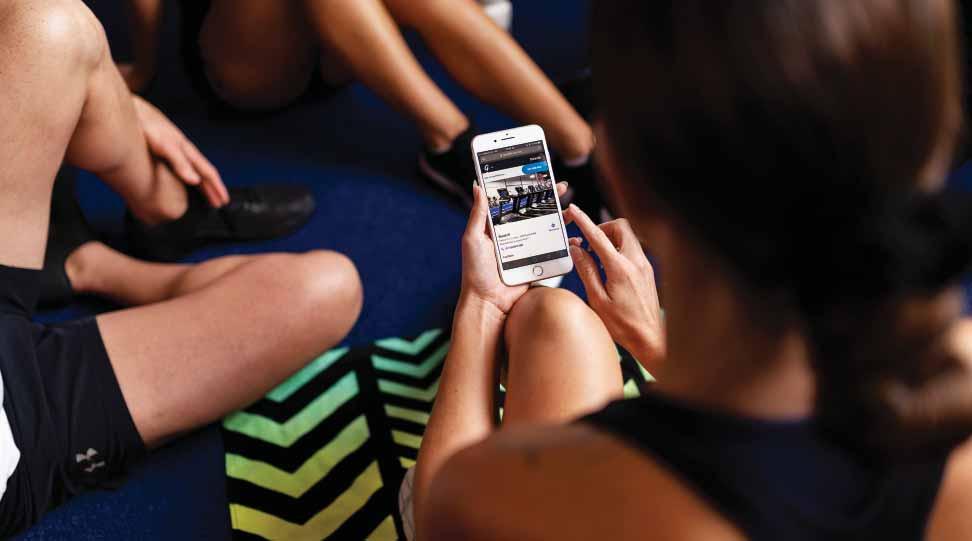
9 minute read
Enriching the Fitness Experience through Technology
Image courtesy Goodlife
Enriching the fi tness experience through technology
Advertisement
The Fitness & Lifestyle Group has long been a technology innovator. Kate Cracknell reports on the Group’s latest initiatives


For Fitness & Lifestyle Group (FLG), technology has long been a driver of competitive advantage. So much so, in fact, that the business has not one but two executive-level heads: Rob Waldron as Chief Technology (above left) and Security Officer and Eddie Swinnen as Chief Digital and Product Officer (above right).
While Waldron focuses predominantly on the tech infrastructure of the business - everything from data governance and quality to software architecture and cyber security - Swinnen is more member-facing, leading the charge on digital products and digitally enhanced member experiences across FLG’s portfolio of brands.
Yet the two men share a clear vision on the role of technology in the business: not as something that replaces people, but rather something that makes the business even more peoplecentric.
Swinnen notes “in my role, it’s about creating best-in-class products that put the customer first, giving them control over their membership and enhancing their overall experience of our brands both in the gym and at home.”
Waldron adds “this is all backed by analytics, which is where my and Eddie’s roles overlap.
“Then behind the scenes, it’s about standardising technology and processes across our regions and our multiple brands so we aren’t reinventing the wheel. We want to take innovations that are already working and embed that competitive advantage across the Group, streamlining our operating environment and driving synergies so our teams have more time to focus on our customers.”
Laying the foundations The first step has been to standardise systems and integrations within the Group, resulting in a platform that allows digital development to be scaled across FLG’s portfolio of brands.
Swinnen explains “this has included simplifying our systems, re-architecting and standardising our web CMS and building a member portal to enable self-service.
“We also upgraded our app development platform into React Native, writing a single code base so we could simultaneously implement branded apps for multiple brands on both iOS and Android.”
Waldron goes on to say “we’ve essentially built a foundation whereby all brands use the same operating platform - meaning they all benefit when we add new features such as online joining, for example - but where each brand can have its own elements for a unique experience.”
Having migrated its infrastructure away from on-premise data centres and into the cloud in 2016, FLG has also become one of the first operators to use a cloud-based data lake.
Waldron advises “in our case, that data lake is Snowflake, and it underpins the roll-out of our business intelligence work.
“It’s where the data analytics magic happens, because it
gives us one central repository for all data from all systems across our entire business.”
Indeed, reporting of key metrics - such as sales, leavers, visitation, personal training and group exercise attendance - has now been consolidated and streamlined across Goodlife Health Clubs and Fitness First Australia, Zap Fitness and Jetts Thailand/New Zealand, with standardised definitions driving consistency of data across brands, sites, markets and systems.
It means any team member - from sales and club managers to regional heads and the Group Chief Executive - can log on to a centralised portal and instantly view highly accurate performance data in easy-to-digest dashboards. Subject to the individual’s role and permissions, this can be done at a club, brand, region or group level, placing insights, trends and opportunities for competitive edge at everyone’s fingertips.
Waldron comments “interestingly, the ability to benchmark club performance by brand or by region is encouraging teams not only to look internally to address issues, but also to collaborate across brands, asking other high-performing clubs within the FLG estate for training and best practice.
“Moving forward, we’ll continue to expand on the types of data and insight we’re extracting from our customer touchpoints, to further enhance the way we support members on their wellness journeys.” Customer convenience Also from a member-facing perspective, FLG recently launched a fully paperless digital joining experience for new members across the Fitness First Australia, Goodlife Australia, Jetts New Zealand and Zap Fitness brands.
By incorporating user insights around how people select memberships and join online, FLG’s new experience has minimised clicks versus industry standards, Swinnen advises “we’ve also slimmed down the product choices to further streamline the end user experience: a few simple membership types to pick from, a handful of options to customise to your needs, and that’s it.
“Our vision was to create a seamless process whereby someone could go online, find their closest club, join, set up their membership, verify their email, pay, go through our health and safety induction and access their new club via their mobile - all within a few minutes. We want onboarding to be quick, simple and self-service for maximum customer convenience.”
The new process therefore includes a mould-breaking approach to health and safety, courtesy of a highly original briefing video that’s been created in collaboration with FLG’s legal and marketing teams. A compulsory watch - club reception is alerted if a new member arrives without watching it - the video uses humour to drive engagement with the message.

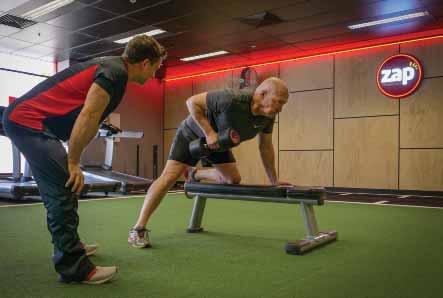
Image courtesy Jetts Thailand

Image courtesy Goodlife
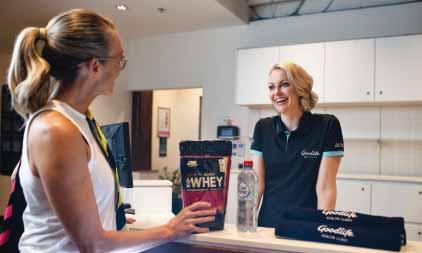
Swinnen goes on to advise “our final step will be to give the new member access to the club via their phone - once they’ve completed their PAR-Q and health and safety waivers - so they don’t have to wait to see someone to get a membership card.
“That’s in R&D stage at the moment.” Driving collaboration Meanwhile, behind the scenes, FLG migrated its entire business from Google Workspaces to Microsoft 365 in March. In the process, it moved from around 4,500 Google licences with hundreds of shared accounts - one for a whole reception team, for example - to approximately 10,800 individual accounts.
Waldron adds “one of the key benefits has been the positive impact on teamwork and collaboration. It took just a couple of weeks for Microsoft Teams usage to skyrocket, for example - a direct result of everyone being individually connected and able to communicate freely.”
Another major benefit is the unprecedented visibility Microsoft 365 provides around data management: “Not only where data is and where it’s going, but who’s sending it and when. This is critical to ensuring we adhere to data privacy requirements.”
Next on the list are a number of cyber security projects, including a 12-18-month journey towards ISO-27001 certification - an international standard relating to information security and effective assessment of cyber risks.
Says Waldron “we’re also working on what in cyber security circles is known as a ‘zero trust’ programme, but for us is about ensuring technology doesn’t get in the way of people doing their jobs. Multi-factor authentication will give the right people secure but seamless access to the right information at the right time, even if they’re working from home and/or on a personal device. It’s about flexibility without compromising data security.”
Finally, following the recent signing of a multi-million dollar deal with Telstra, FLG is piloting a project to replace and upgrade the network infrastructure solution across its estate to ensure internet capacity meets the demands of in-person digital experiences.
Waldron concludes “as part of the agreement, Telstra will provide us with an internet failover, whereby a 4G/5G service kicks in within seconds of any internet outage. Particularly as a 24/7 operator, that’s hugely important.” Kate Cracknell is a freelance journalist, editor and copywriter and a former Editor of the UK’s Health Club Management magazine.
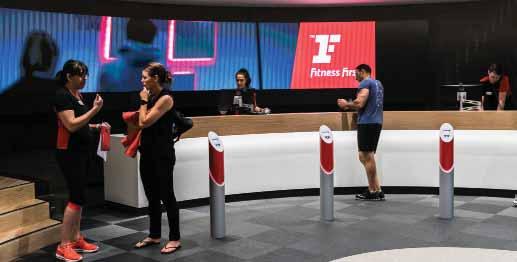
Lismore fi tness club owner Matt George inspires community’s post-fl ood recovery
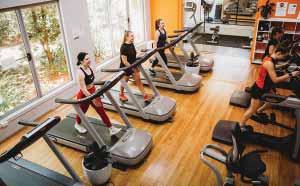
The disastrous floods that impacted the Northern Rivers region of NSW at the end of February and beginning of March saw Matt George, owner of Lismore’s Summit Health and Fitness, step in to help drive the recovery of his community.
While his gym, located east of Lismore in Goonellabah, was not impacted by the floods, George opened the facility on Monday 28th February and Tuesday 1st March as an emergency shelter and evacuation centre for floodimpacted residents with over 70 individuals and families making use of the gym’s floor space.
Immediately after that, with almost all of Lismore’s supermarkets and food retailers out of operation, he converted the gym’s space to a foodbank.
As George notes “before the emergency services and bureaucracy kicked in we were able to help those who’d been affected by floods and needed food, water, medical supplies and more.
“Drawing the community together, we were just locals getting stuff done.”
However, with Goonellabah located 10 minutes’ drive east of Lismore and away from the worst of the flood damage, George soon realised that with people unable to purchase fuel to make the journey to the foodbank, the facility would have to relocate.
As a result, he teamed with Karen Willott, owner of a used furniture warehouse in Lismore (from which she lost everything in the floods, including her income source), to create a larger distribution centre for resources.
The warehouse at 51 Wyrallah Road, Lismore distributed huge quantities of food, water, medical supplies to those in need, supported by generous donations from the community and across the country.
As George noted “we have trucks, semi-trailers rolling in with resources … with resources coming in and goods are flying out the door at a similar rate.
“We’ve even helped support some of the military now on the ground.”
Amid all this Summit Health and Fitness reopened within two weeks of the floods on Monday 14th March, returning to normal business operations including group fitness classes, personal training, EMS and swim lessons and squads.
Again extending his generosity, George advises “we understand that the community has suffered greatly in the last two weeks and if required, we will timestop or cancel any memberships with no fees.”
He added “Summit plays a vital role in looking after people’s mental and physical well-being (and we) recognise that these are uncertain times are not the time to be locked in to any membership.”
George, who will continue his free foodbank in the Lismore CBD, as well as operating his Summit Health and Fitness, concludes “we will get through this together.”










